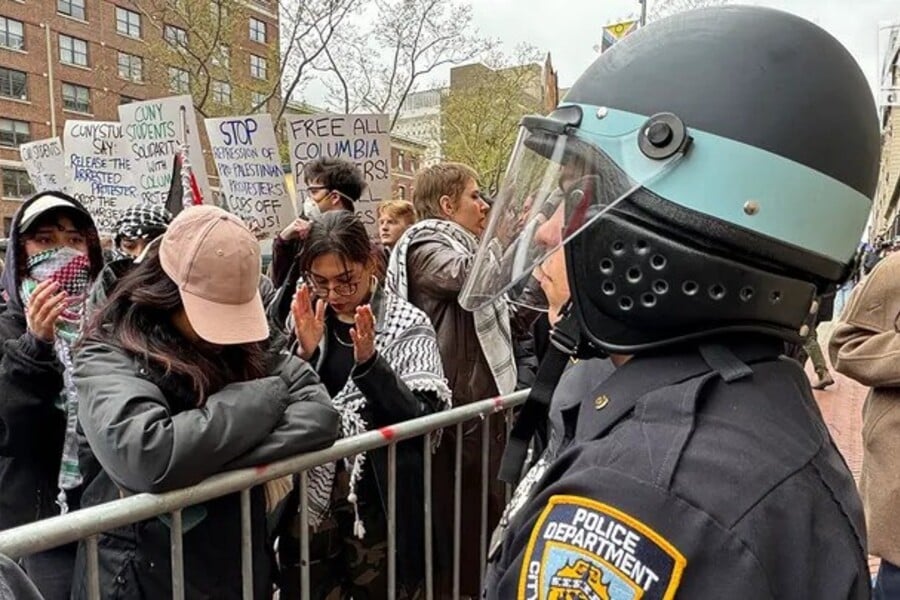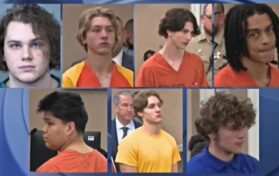
In response to escalating tensions and growing safety concerns following anti-Israel protests, Columbia University announced it will transition to online classes to “reset” and de-escalate the campus atmosphere. This drastic measure comes as the university grapples with both external agitations and internal calls for peace and dialogue amidst an encampment of protesters on its grounds.
The protests, which began as a pro-Palestinian response to the recent Israel-Hamas conflict, quickly intensified, leading to the arrest of over 100 individuals and a virtual instruction mandate from the university’s president, Dr. Nemat “Minouche” Shafik. In a statement released early Monday, Shafik expressed profound sadness over the antisemitic rhetoric and disruptive presence of non-affiliated agitators, emphasizing the university’s commitment to re-establishing a safe and respectful academic environment.
“Antisemitic language and intimidating behavior have no place on our campus,” Shafik stated, condemning the actions that have stoked fears among students. She announced the formation of a working group, including deans and faculty, to address the crisis and discuss future steps to secure the campus and support the university community.
Growing Calls for Protection
The severity of the situation was underscored by numerous appeals from Jewish leaders and organizations urging the university to protect its students against what they describe as rampant antisemitism and violent incitement. A statement from the White House labeled the threats and intimidation as “blatantly antisemitic” and “dangerous,” affirming that such behavior is unacceptable anywhere in America.
Echoing this sentiment, Shafik detailed plans to enhance security, including hiring additional personnel and enforcing stricter ID checks, especially with Passover commencing. “Our priority is the safety and well-being of all students, and we are taking decisive action to preserve our community’s integrity,” she explained.
The Encampment and Arrests
The focal point of the unrest has been the pro-Palestinian encampment established on campus, purportedly in solidarity with Gaza. Last Thursday, following a direct appeal from President Shafik, NYPD intervened, resulting in 113 arrests. The protesters, described by police as peaceful and non-resistant, were primarily advocating for Columbia to divest interests linked to Israel and protesting the bombardment of Gaza, which has led to significant civilian casualties.
Among those arrested was Maryam Alwan, a student organizer who decried the administration’s response as part of a broader “repressive campaign against pro-Palestine advocacy.” This sentiment was echoed by other student voices who felt marginalized and criminalized for their political expressions.
Campus and National Reactions
The protests at Columbia have resonated nationally, with similar demonstrations occurring at universities across the country, including the New School, Yale, and USC, each presenting varying degrees of solidarity and demands for institutional divestment from entities associated with geopolitical conflicts.
This national wave of campus activism reflects a profound student engagement with global issues, particularly the Israeli-Palestinian conflict, which has historically ignited passions and debate in academic settings.
Administrative and Political Backlash
The handling of the protests by Columbia University has not only drawn criticism from the campus community but has also caught the attention of political figures, leading to significant backlash and calls for greater accountability.
Representative Elise Stefanik publicly reprimanded President Minouche Shafik during a congressional hearing, denouncing her management of the antisemitic elements of the protests as ineffective.
Stefanik’s critique added to the growing demands for action, which include prominent voices such as Senator John Fetterman and New York City Mayor Eric Adams, both of whom have spoken out against the university’s response.
Senator Fetterman, aligning with the White House’s stance, underscored the protests as “antisemitic, unconscionable, and dangerous,” and pressured President Shafik to either take decisive action or resign. His pointed criticism reflects a broader expectation for university leaders to not only address but also preempt any actions that compromise student safety and campus harmony.
Mayor Adams focused on the law enforcement aspect, highlighting the NYPD’s commitment to maintaining order and protecting all community members. “Hate has no place in our city,” Adams declared, asserting that any violation of law, especially those involving hate speech and intimidation, would be met with strict enforcement.
This stance by the mayor aims to reinforce a zero-tolerance policy against antisemitism and to ensure that the freedoms of speech and protest are not marred by violence and bigotry.
Moreover, the administrative response has been seen as a litmus test for Columbia’s governance under crisis. The calls for President Shafik’s resignation from multiple quarters signal a deep dissatisfaction with how the university has balanced the need for safety with the preservation of academic and speech freedoms. These political reactions are shaping a pivotal moment for Columbia, as it navigates the dual challenges of managing campus unrest and upholding its principles in a politically polarized environment.
This backlash underscores the critical need for effective leadership and proactive measures in times of crisis, setting a precedent for how universities might handle similar situations in the future.
The Columbia community remains deeply divided. On one hand, there are strong calls for the university to uphold free speech and allow peaceful protests. On the other, there is a significant pushback against what many see as incitement to violence and hate speech.
Students like Nicholas Baum and Sonya Pozansky articulate a stark dichotomy: while Baum insists on staying as a statement of resilience, Pozansky condemns the transformation of political protests into vectors of violence and Jewish hatred. Both students highlight the personal and communal strains that these protests have exacerbated.
As Columbia University strives to navigate these tumultuous events, the focus is squarely on reconciling the urgent need for safety with the imperative to foster an inclusive, respectful dialogical space. President Shafik’s calls for a “reset” reflect a broader necessity to reevaluate how universities address and manage campus unrest tied to global political conflicts.
With the establishment of additional security measures and the ongoing efforts of the designated working group, Columbia aims to mitigate the immediate risks and lay the groundwork for a more peaceful and productive end to the academic year. The community’s response in the coming days will likely serve as a barometer for the potential long-term changes in university policy and campus culture surrounding such complex and emotive issues.





